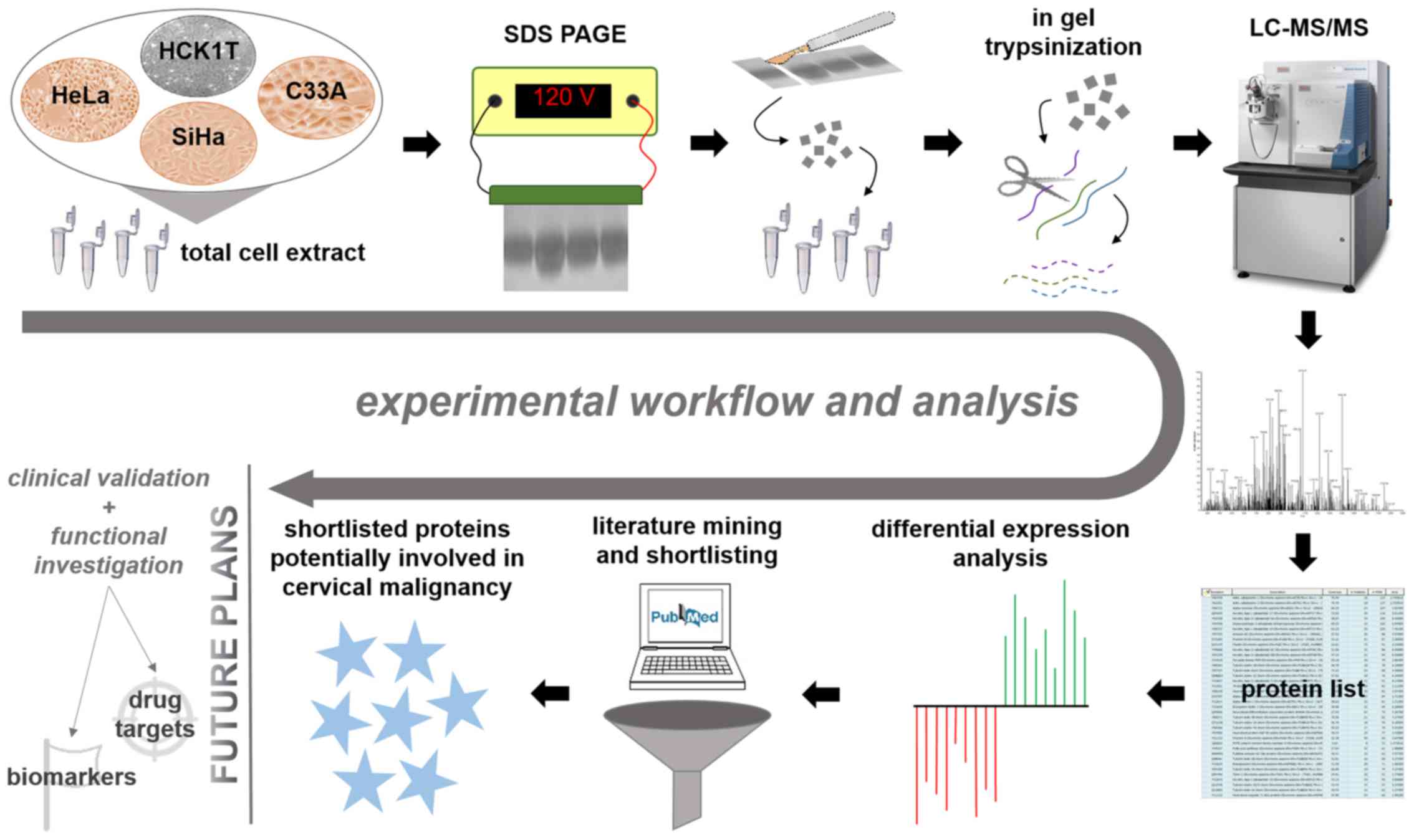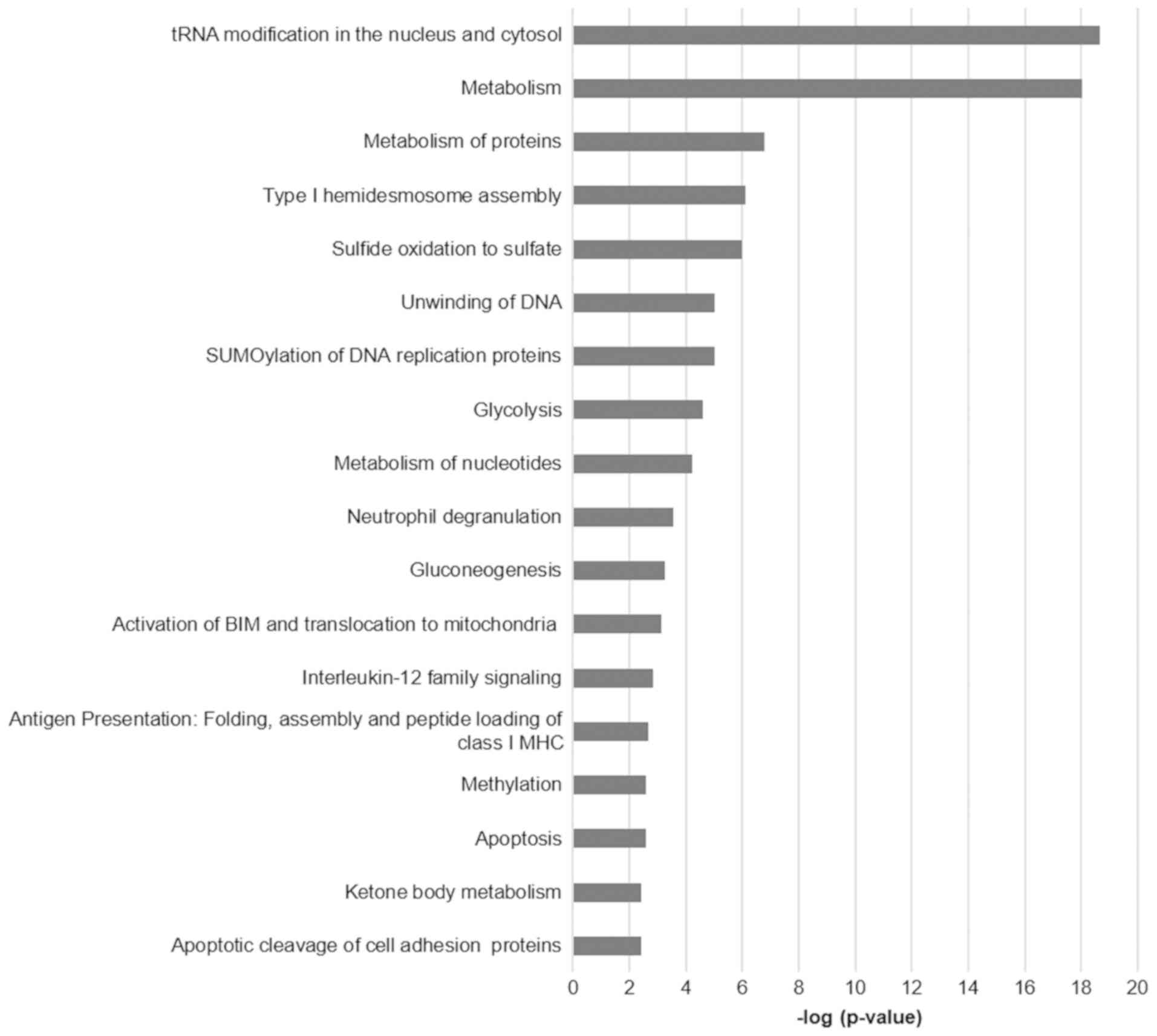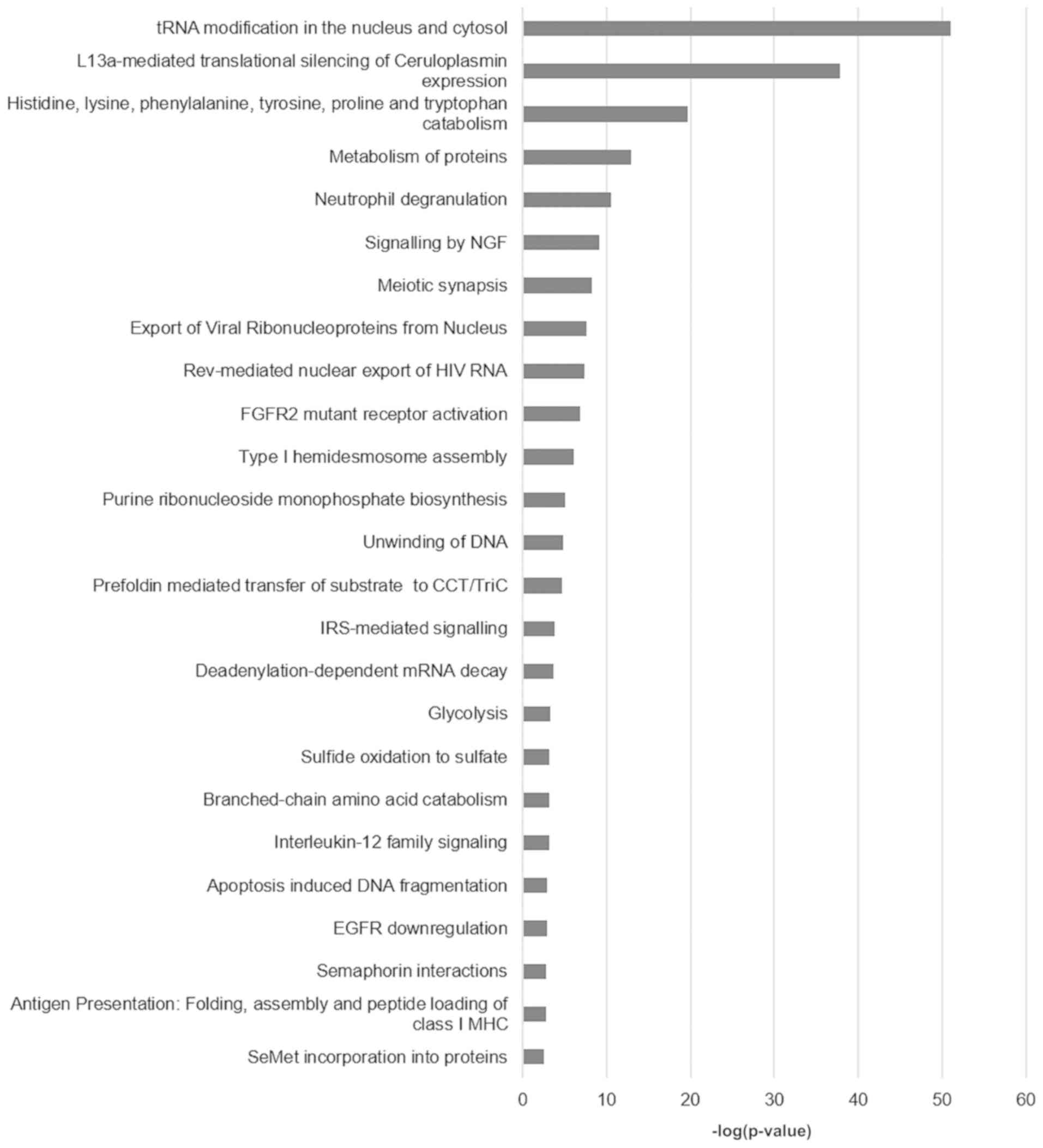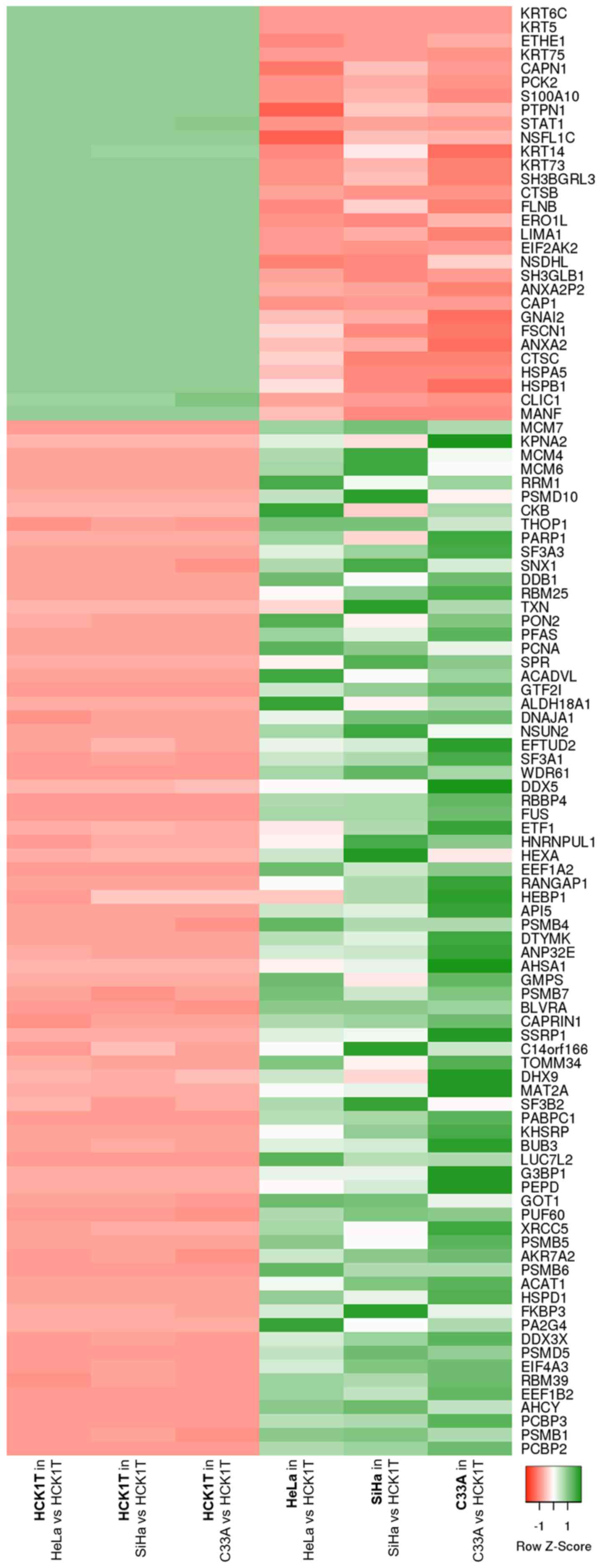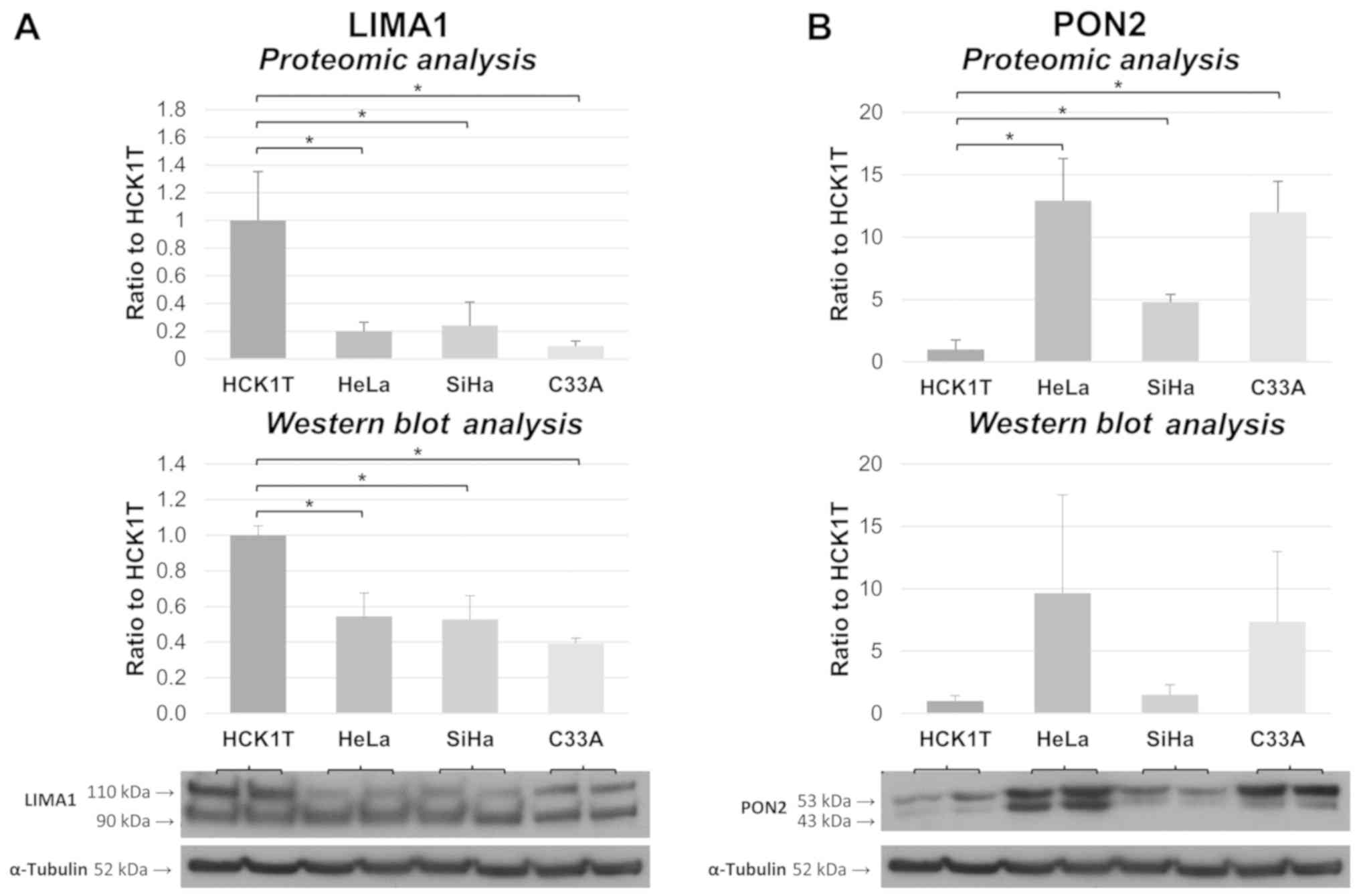|
1
|
Bray F, Ferlay J, Soerjomataram I, Siegel
RL, Torre LA and Jemal A: Global cancer statistics 2018: GLOBOCAN
estimates of incidence and mortality worldwide for 36 cancers in
185 countries. CA Cancer J Clin. 68:394–424. 2018. View Article : Google Scholar : PubMed/NCBI
|
|
2
|
Woodman CB, Collins SI and Young LS: The
natural history of cervical HPV infection: Unresolved issues. Nat
Rev Cancer. 7:11–22. 2007. View
Article : Google Scholar : PubMed/NCBI
|
|
3
|
Dewar MA, Hall K and Perchalski J:
Cervical cancer screening. Past success and future challenge. Prim
Care. 19:589–606. 1992.PubMed/NCBI
|
|
4
|
Pimple S, Mishra G and Shastri S: Global
strategies for cervical cancer prevention. Curr Opin Obstet
Gynecol. 28:4–10. 2016. View Article : Google Scholar : PubMed/NCBI
|
|
5
|
Lawrenz B, Mahajan N and Fatemi HM: The
effects of cancer therapy on women's fertility: What do we know
now? Future Oncol. 12:1721–1729. 2016. View Article : Google Scholar : PubMed/NCBI
|
|
6
|
Bentivegna E, Maulard A, Pautier P,
Chargari C, Gouy S and Morice P: Fertility results and pregnancy
outcomes after conservative treatment of cervical cancer: A
systematic review of the literature. Fertil Steril. 106:1195–1211,
e1195. 2016. View Article : Google Scholar : PubMed/NCBI
|
|
7
|
Barra F, Lorusso D, Leone Roberti Maggiore
U, Ditto A, Bogani G, Raspagliesi F and Ferrero S: Investigational
drugs for the treatment of cervical cancer. Expert Opin Investig
Drugs. 26:389–402. 2017. View Article : Google Scholar : PubMed/NCBI
|
|
8
|
Kontostathi G, Zoidakis J, Anagnou NP,
Pappa KI, Vlahou A and Makridakis M: Proteomics approaches in
cervical cancer: Focus on the discovery of biomarkers for diagnosis
and drug treatment monitoring. Expert Rev Proteomics. 13:731–745.
2016. View Article : Google Scholar : PubMed/NCBI
|
|
9
|
Pappa KI, Kontostathi G, Makridakis M,
Lygirou V, Zoidakis J, Daskalakis G and Anagnou NP: High resolution
proteomic analysis of the cervical cancer cell lines secretome
documents deregulation of multiple proteases. Cancer Genomics
Proteomics. 14:507–521. 2017.PubMed/NCBI
|
|
10
|
Pappa KI, Christou P, Xholi A, Mermelekas
G, Kontostathi G, Lygirou V, Makridakis M, Zoidakis J and Anagnou
NP: Membrane proteomics of cervical cancer cell lines reveal
insights on the process of cervical carcinogenesis. Int J Oncol.
53:2111–2122. 2018.PubMed/NCBI
|
|
11
|
Makridakis M, Gagos S, Petrolekas A,
Roubelakis MG, Bitsika V, Stravodimos K, Pavlakis K, Anagnou NP,
Coleman J and Vlahou A: Chromosomal and proteome analysis of a new
T24-based cell line model for aggressive bladder cancer.
Proteomics. 9:287–298. 2009. View Article : Google Scholar : PubMed/NCBI
|
|
12
|
Narisawa-Saito M, Handa K, Yugawa T, Ohno
S, Fujita M and Kiyono T: HPV16 E6-mediated stabilization of ErbB2
in neoplastic transformation of human cervical keratinocytes.
Oncogene. 26:2988–2996. 2007. View Article : Google Scholar : PubMed/NCBI
|
|
13
|
Yugawa T, Handa K, Narisawa-Saito M, Ohno
S, Fujita M and Kiyono T: Regulation of Notch1 gene expression by
p53 in epithelial cells. Mol Cell Biol. 27:3732–3742. 2007.
View Article : Google Scholar : PubMed/NCBI
|
|
14
|
Makridakis M and Vlahou A: GeLC-MS: A
sample preparation method for proteomics analysis of minimal amount
of tissue. Methods Mol Biol. 1788:165–175. 2018. View Article : Google Scholar : PubMed/NCBI
|
|
15
|
Filip S, Vougas K, Zoidakis J, Latosinska
A, Mullen W, Spasovski G, Mischak H, Vlahou A and Jankowski J:
Comparison of depletion strategies for the enrichment of
low-abundance proteins in urine. PLoS One. 10:e01337732015.
View Article : Google Scholar : PubMed/NCBI
|
|
16
|
Babicki S, Arndt D, Marcu A, Liang Y,
Grant JR, Maciejewski A and Wishart DS: Heatmapper: Web-enabled
heat mapping for all. Nucleic Acids Res. 44:W147–W153. 2016.
View Article : Google Scholar : PubMed/NCBI
|
|
17
|
Bindea G, Mlecnik B, Hackl H, Charoentong
P, Tosolini M, Kirilovsky A, Fridman WH, Pagès F, Trajanoski Z and
Galon J: ClueGO: A cytoscape plug-in to decipher functionally
grouped gene ontology and pathway annotation networks.
Bioinformatics. 25:1091–1093. 2009. View Article : Google Scholar : PubMed/NCBI
|
|
18
|
Shannon P, Markiel A, Ozier O, Baliga NS,
Wang JT, Ramage D, Amin N, Schwikowski B and Ideker T: Cytoscape: A
software environment for integrated models of biomolecular
interaction networks. Genome Res. 13:2498–2504. 2003. View Article : Google Scholar : PubMed/NCBI
|
|
19
|
Giordano G, Cole TB, Furlong CE and Costa
LG: Paraoxonase 2 (PON2) in the mouse central nervous system: A
neuroprotective role? Toxicol Appl Pharmacol. 256:369–378. 2011.
View Article : Google Scholar : PubMed/NCBI
|
|
20
|
Hanahan D and Weinberg RA: Hallmarks of
cancer: The next generation. Cell. 144:646–674. 2011. View Article : Google Scholar : PubMed/NCBI
|
|
21
|
Collins RJ, Jiang WG, Hargest R, Mason MD
and Sanders AJ: EPLIN: A fundamental actin regulator in cancer
metastasis? Cancer Metastasis Rev. 34:753–764. 2015. View Article : Google Scholar : PubMed/NCBI
|
|
22
|
Ohashi T, Idogawa M, Sasaki Y and Tokino
T: p53 mediates the suppression of cancer cell invasion by inducing
LIMA1/EPLIN. Cancer Lett. 390:58–66. 2017. View Article : Google Scholar : PubMed/NCBI
|
|
23
|
Liu R, Martin TA, Jordan NJ, Ruge F, Ye L
and Jiang WG: Epithelial protein lost in neoplasm-α (EPLIN-α) is a
potential prognostic marker for the progression of epithelial
ovarian cancer. Int J Oncol. 48:2488–2496. 2016. View Article : Google Scholar : PubMed/NCBI
|
|
24
|
Gousias K, Becker AJ, Simon M and
Niehusmann P: Nuclear karyopherin a2: A novel biomarker for
infiltrative astrocytomas. J Neurooncol. 109:545–553. 2012.
View Article : Google Scholar : PubMed/NCBI
|
|
25
|
Li C, Ji L, Ding ZY, Zhang QD and Huang
GR: Overexpression of KPNA2 correlates with poor prognosis in
patients with gastric adenocarcinoma. Tumour Biol. 34:1021–1026.
2013. View Article : Google Scholar : PubMed/NCBI
|
|
26
|
Grupp K, Habermann M, Sirma H, Simon R,
Steurer S, Hube-Magg C, Prien K, Burkhardt L, Jedrzejewska K,
Salomon G, et al: High nuclear karyopherin α2 expression is a
strong and independent predictor of biochemical recurrence in
prostate cancer patients treated by radical prostatectomy. Mod
Pathol. 27:96–106. 2014. View Article : Google Scholar : PubMed/NCBI
|
|
27
|
Tsukagoshi M, Araki K, Yokobori T, Altan
B, Suzuki H, Kubo N, Watanabe A, Ishii N, Hosouchi Y, Nishiyama M,
et al: Overexpression of karyopherin-α2 in cholangiocarcinoma
correlates with poor prognosis and gemcitabine sensitivity via
nuclear translocation of DNA repair proteins. Oncotarget.
8:42159–42172. 2017. View Article : Google Scholar : PubMed/NCBI
|
|
28
|
Yu L, Wang G, Zhang Q, Gao L, Huang R,
Chen Y, Tang Q, Liu J, Liu C, Wang H and Wang X: Karyopherin alpha
2 expression is a novel diagnostic and prognostic factor for
colorectal cancer. Oncol Lett. 13:1194–1200. 2017. View Article : Google Scholar : PubMed/NCBI
|
|
29
|
Krüger M, Pabst AM, Al-Nawas B, Horke S
and Moergel M: Paraoxonase-2 (PON2) protects oral squamous cell
cancer cells against irradiation-induced apoptosis. J Cancer Res
Clin Oncol. 141:1757–1766. 2015. View Article : Google Scholar : PubMed/NCBI
|
|
30
|
Krüger M, Amort J, Wilgenbus P,
Helmstädter JP, Grechowa I, Ebert J, Tenzer S, Moergel M, Witte I
and Horke S: The anti-apoptotic PON2 protein is
Wnt/β-catenin-regulated and correlates with radiotherapy resistance
in OSCC patients. Oncotarget. 7:51082–51095. 2016. View Article : Google Scholar : PubMed/NCBI
|
|
31
|
Bacchetti T, Sartini D, Pozzi V,
Cacciamani T, Ferretti G and Emanuelli M: Exploring the role of
paraoxonase-2 in bladder cancer: Analyses performed on tissue
samples, urines and cell cultures. Oncotarget. 8:28785–28795. 2017.
View Article : Google Scholar : PubMed/NCBI
|
|
32
|
Devarajan A, Su F, Grijalva V, Yalamanchi
M, Yalamanchi A, Gao F, Trost H, Nwokedi J, Farias-Eisner G,
Farias-Eisner R, et al: Paraoxonase 2 overexpression inhibits tumor
development in a mouse model of ovarian cancer. Cell Death Dis.
9:3922018. View Article : Google Scholar : PubMed/NCBI
|
|
33
|
Sabile AA, Arlt MJ, Muff R, Husmann K,
Hess D, Bertz J, Langsam B, Aemisegger C, Ziegler U, Born W and
Fuchs B: Caprin-1, a novel Cyr61-interacting protein, promotes
osteosarcoma tumor growth and lung metastasis in mice. Biochim
Biophys Acta. 1832:1173–1182. 2013. View Article : Google Scholar : PubMed/NCBI
|
|
34
|
Gong B, Hu H, Chen J, Cao S, Yu J, Xue J,
Chen F, Cai Y, He H and Zhang L: Caprin-1 is a novel microRNA-223
target for regulating the proliferation and invasion of human
breast cancer cells. Biomed Pharmacother. 67:629–636. 2013.
View Article : Google Scholar : PubMed/NCBI
|
|
35
|
Tan N, Dai L, Liu X, Pan G, Chen H, Huang
J and Xu Q: Upregulation of caprin1 expression is associated with
poor prognosis in hepatocellular carcinoma. Pathol Res Pract.
213:1563–1567. 2017. View Article : Google Scholar : PubMed/NCBI
|















